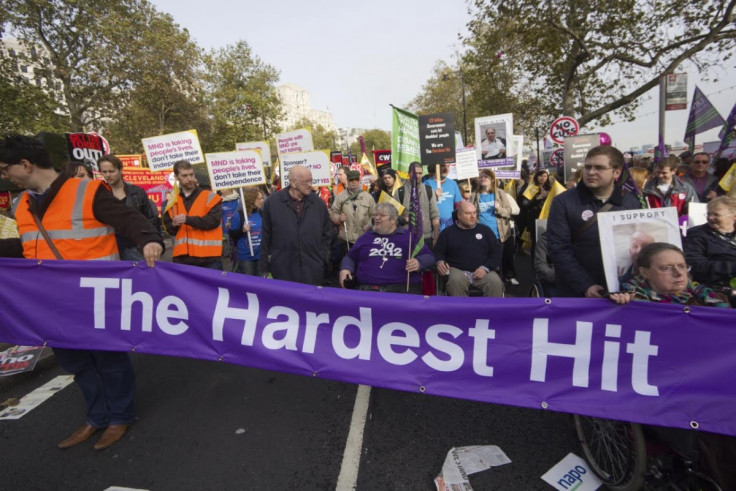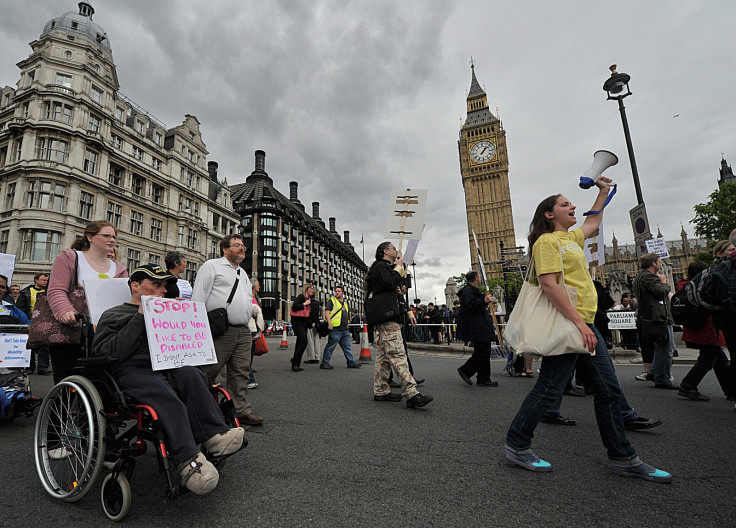I've cried twice over my disability – once from bullying, the other after my PIP assessment
The humiliating experience showed me that in another country and another time, I would have been marked for disposal.
The first time I cried about my disability was after being bullied at school — nothing particularly unusual there. It is a curse many face, able-bodied or otherwise.
But the same cannot be said for the second occasion. In February this year, aged 26, I completely broke down in the middle of the street. Long-since hardened and adept at dealing with cowardly taunts, it took a force much stronger to re-open old wounds; an ambush from an enemy I did not expect, one hidden in sheep's clothing.
The British government.
As a person living with cerebral palsy since birth — when I was born prematurely at 24 weeks, weighing 900 grams — I cannot walk and am a full-time wheelchair user, granting me the highest level of disability benefit.
Used to help with the huge additional costs of living with a disability, including care and related needs, this £139-a-week has helped me fund private physio sessions from the age of 15, when the NHS deemed I was no longer "a priority" and withdrew regular support — despite its vital importance.
As much as I hated the exercises as a child, they continue to help maintain what little mobility I do have. This means I can work with carers to undertake the basics of life, such as showering and going to the toilet.
But since 2013, millions of disabled people in Britain, including myself, have seen this lifeline placed in grave danger.
A revamp by the Department for Work and Pensions (DWP), under then minister Iain Duncan Smith, saw the allowance renamed from Disability Living Allowance to Personal Independence Payment (PIP), and repackaged to officially ensure "support" was targeted "at those who need it most" in an effort to save £1.3bn ($1.7bn) by 2020.
Beneath the fluffy language, this meant I, along with every disabled person under 65 receiving support, faced mandatory reassessment – irrespective of condition or NHS records.
I tried to ignore the immediate cloud of suspicion this created. I told myself that even amid huge budget cuts to the disability budget, the impact of my cerebral palsy remained indisputable. Or so I thought.
I forgot we live in an age of alternative facts.
Bluntly, the interview proved one of the most unnecessarily humiliating experiences of my life — exposing the farcical reality of a process that is both woefully unfit for purpose and borderline duplicitous.
Outsourced to two private healthcare companies, Atos and Capita – to the tune of £500m funded by the British taxpayer – it is a two-step process.
First, I needed to fill out a form detailing how my disability affected my life; my daily routine, the support I needed, my occupation. This in itself was cumbersome, totalling 40 pages. I know full well what I cannot do and medical records prove it. Despite being lucky in avoiding the learning difficulties that can come with cerebral palsy, I wake up every morning needing help to get out of bed, wash and get dressed.
And that's before fighting the access problems and other systemic discrimination, which, although improving, still exists.

Life is great fun – yet also a constant battle.
But despite all this, I was called in for a secondary face-to-face interview to address concerns over the authenticity of my application. I would be quizzed over the information I had given, supposedly undertaken by a healthcare professional (more on that later), which would then be rewritten and sent to the "Decision Maker".
The assessment centre was nondescript, with one-way windows concealing a waiting room full of tension. Unlike some of the others present, I still felt more intrigued than worried about what awaited. That was until my name was called.
From the outset my interviewer treated me with an attitude of distrust — this clearly was not to be a dialogue, but a clinical interrogation.
As I entered, she said "oh, you have an electric wheelchair — you didn't tell us". In fact, far from failing to disclose this, it was on page three of the form I submitted, which lay on her desk. It quickly became apparent to me that, at best, the details of my case had been skimmed, or at worst not read at all.
"Tell me how your learning difficulties and cerebral palsy affect you", she began. Somewhat shocked, I explained that I do not have learning difficulties and instead hold two degrees, now making a living as a journalist. Points made very clear on my form. Backtracking, she claimed she had "got confused" and had made a "mistake".
The interview proved one of the most unnecessarily humiliating experiences of my life
But things got no better. This so-called 'medical professional' seemingly knew nothing of cerebral palsy. It was left to me to explain that it was a sliding scale and luckily only affected my mobility. She decided to describe it as "muscle wastage". It is a neurological condition.
Further analysis was limited to looking me up and down and literally picking on parts of my body from her desk.
"Your left hand, what's wrong with it?" she barked, noticing its less nimble nature. "It's not very flexible" I replied. For years I have made jokes about this, playing on the "my bad hand" joke in Scary Movie. But here no such urge came. I felt like a specimen on a treatment table.
The abrasive attitude aside, my frustration and rage built over the laughable irrelevance of the questions. Considering the assessment is meant to solely judge how my disability affects my life, I found it bizarre to be asked more than once about the number of bedrooms and flights of stairs in my home.
"Why does that matter, I can't walk up one step," I queried. "We have a stair lift to the first floor where I sleep."
"Answer the question," came the terse reply.
Soon the conversation took an even stranger personal twist. I was asked to describe in detail the parts of my body I could wash in the bath. When the female assessor reached, in her words, "the bottom half," I slightly lost my composure, retorting dryly: "Well, I can reach my testicles, but not my toes."
My nerves were frayed — not so much over the line of questioning, but its incredibly pedantic nature. Regardless of my washing abilities, I still need help to get in the bath – given that I can't walk.
The interrogation process reflected a rigid, robotic attempt to shoehorn all disabled people in to generalised descriptors, with no awareness of the practical realities of life with these additional burdens.

After over an hour of finding myself repeating "I can't", a switch went in my brain. I became vividly aware of the situation I was in. Amid the blank walls, the sheer gall of having to justify my disability within a system purpose-built to undermine all available medical evidence was no longer intriguing. It was disgustingly offensive.
This wave of emotion rose and rose. I considered leaving in protest when asked "if I had friends" and "got on with people", but stopped myself over fear of the consequences. My application would likely be terminated, my care affected, my family pressured.
Trapped in this space, all I could do was let my disdain run wild. "Oh, I get on with people okay generally I think, unless I hate them," I said.
"I hope you don't hate me," my assessor joked.
"No, not quite yet".
Then, finally, after being asked to touch the tips of my fingers and lift up my feet as a test of my disability, I was set free.
The next few minutes were a blur. I had an overwhelming urge to escape — knowing that if I stayed in that environment any longer I would explode. It turned out to be a good choice, as seconds later, half-way down the high street, my emotional timebomb detonated.
But rather than shout or scream, I cried in an uncontrollable exorcism of anger. The flood of tears fell to such an extent that two bystanders came to ask if I was okay.
To this state machine I am a disability — a non-human entity from which costs can be cut
My mother, who had waited outside the assessment room on standby in case I was required to demonstrate my inability to walk, asked what happened in frantic concern. I couldn't respond immediately. Eventually I found some words: "It's not human, it's just so degrading".
I have thought long and hard about what opened the floodgates. I was as shocked at my own reaction as the few friends I have told were. I felt regret and shame at letting myself be overwhelmed, just like I did once after school, in a manner so completely at odds with the humour and steely conviction with which I tackle my disability.
But now I have realised, it made perfect sense. The 'assessment', in one fell swoop, completely disregarded the existence of my personality, achievements, and the fight to assert my own sense of self. To this state machine I am a disability — a non-human entity from which costs can be cut.
Of course the ultimate irony is that when my PIP decision came through, nothing was changed.
In broader national terms, the impact of PIP has been fractious and its worth discredited. Up until October 2016, 110,000 out of 526,000 claimants who were reassessed lost their benefits. However, according to The Daily Mirror, 60% of the 90,000 claimants who appealed saw their PIP decisions overturned at a tribunal.
And last year, the Office for Budget Responsibility forecast that, rather than PIP saving money, it will see benefit costs rise to £66.4bn between 2015 and 2019 - an increase of £10.5bn from original estimates.
Which begs the question, what was the point? What I saw was a dangerous creation, aligned to the darkest of historical precedents. In another country and another time, I would have been marked for disposal.
A general election looms, but my reasons for writing this extend beyond party politics. I write this to make my voice heard and expose the reality of a squalid system, unbeknown to those outside its clutches, that preys on vulnerability and lacks even the most basic humanity.
I am more than a disability – I am a person.
*The Department for Work and Pensions has not yet responded to a request for a comment.
Alex Taylor is a reporter at the International Business Times
© Copyright IBTimes 2025. All rights reserved.






















